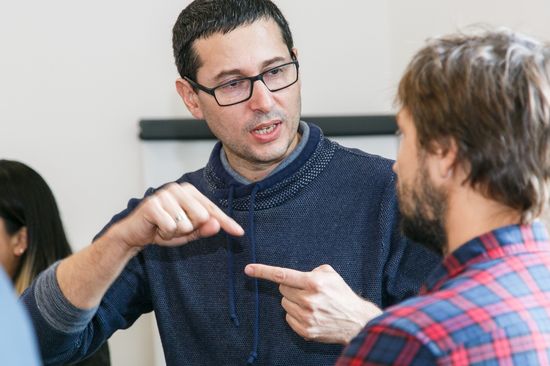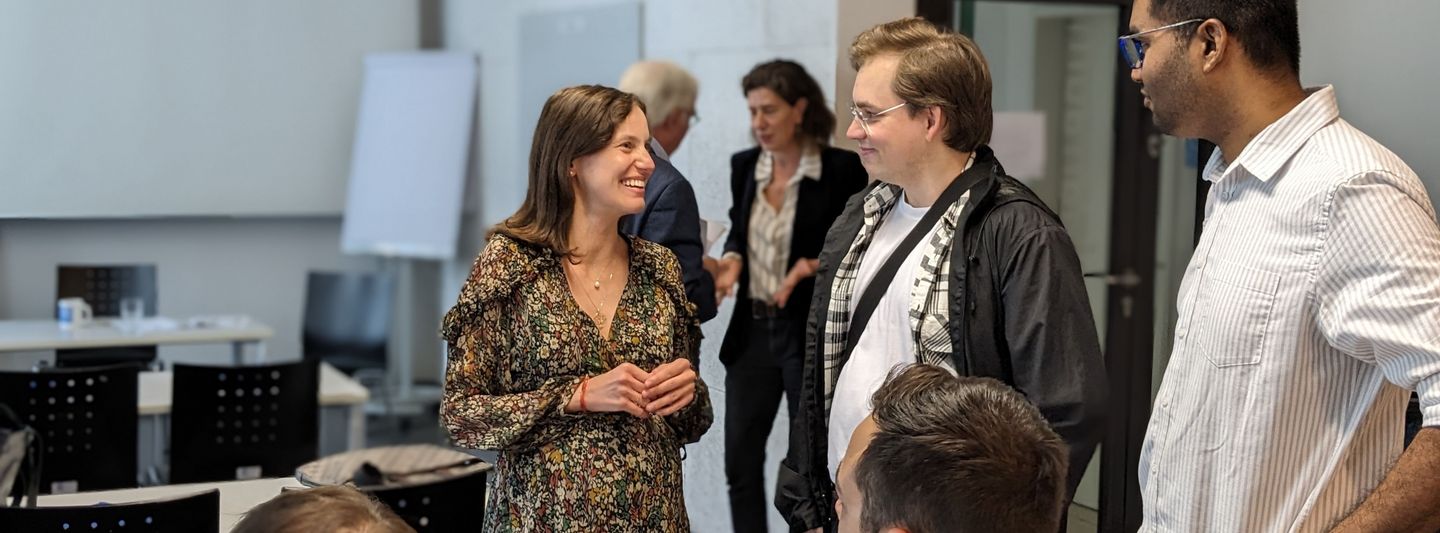Executive MBA


Welcome to the TU Wien Academy for Continuing Education, where we provide a comprehensive range of lifelong learning opportunities for professionals, academics and executives. Our mission is to empower our students with top-tier education and training, enabling them to excel in their chosen fields.
Focus on transformative mobility: Highlights of technological, social and ecological aspects for a sustainable transport future.
![[Translate to English:] Mobi](/fileadmin/_processed_/4/a/csm_MOBI_Website_02267819dc.png)
During my studies at RWTH Aachen and in my dissertation, I primarily focused on freight transport and mobility topics. This led me to Fraunhofer Austria and TU Wien in 2011. At Fraunhofer, I head the research coordination, and at TU Wien, I lead the "Mobility Transformation" program and lecture in "Logistics." My responsibilities at Fraunhofer include applying for and managing publicly funded research projects, strategically advancing our research activities and topics, building networks with ministries and associations, and handling various internal projects. As a project leader, I focus on the research topic of the "Physical Internet," lead two projects, and participate in an exciting international EU project.
Mobility Transformation refers to the "mobility revolution"—a fundamental change in how people and goods move through our transport network. In the context of climate change, mobility must be made more efficient, sustainable, safe, and accessible to significantly reduce CO2 emissions. This encompasses technological, societal, economic, and especially ecological aspects, all of which are holistically covered in our Executive MBA.
We take a holistic approach to mobility, structuring our program into three complementary content blocks. In "Mobility Technologies," we address zero-emission propulsion technologies and automated driving. This is closely linked to mobility infrastructure, focusing on sustainable transport networks, charging infrastructure, and sustainable multimodal freight transport. The program is rounded out by "Platforms & Business Models," where we explore digitalization aspects in passenger and freight transport and teach innovative business models around mobility.
The program is ideal for intrinsically motivated individuals who want to make a difference! Whether or not they have prior expertise, the key is the desire to contribute to climate-friendly mobility. We have had both career changers and experts participate in our program.
Students learn, for example, how to apply the GLEC Framework to calculate logistics emissions according to ISO 14083 and make sustainable transport decisions based on this. They also get to know the concept of the Physical Internet, an innovative global logistics system that represents a paradigm shift in how goods are transported, stored, and distributed.
Almost all graduates have experienced a career boost or changed jobs after completing the Executive MBA. Most are now in responsible positions in the mobility sectors of large national or international companies.
The Physical Internet is a vision for a highly connected, standardized, and efficient transport logistics system. By utilizing IoT and promoting collaboration and standardization, companies can increase efficiency, reduce costs, and minimize environmental impacts. Implementing this concept requires close cooperation among various stakeholders, including manufacturing and transport companies, governments, research institutions, and investments in infrastructure and technology. If these challenges are met, the Physical Internet has the potential to revolutionize transport logistics and pave the way for sustainable and future-proof mobility.
Collaborative transport networks are a key element of the Physical Internet. They enable companies to share resources, information, and infrastructure to improve efficiency, flexibility, and sustainability. Important aspects include reducing emissions through fewer empty runs by bundling, optimizing route planning through shared data and route information, and using digital platforms and networks to facilitate information exchange and coordination among partners.
Integrated transport and production planning offers significant efficiency gains through better resource utilization, cost reduction, and increased flexibility and customer satisfaction. By using IoT devices and closely coordinating production and logistics, companies can enhance their competitiveness while achieving their sustainability goals. Implementing such integrated planning requires careful planning, appropriate IT systems, and close collaboration between various departments and partners in the supply chain.
We cover the Physical Internet, new propulsion technologies, innovative digitalization concepts, micro-hub concepts, new delivery models for urban logistics, and have guest experts discussing their current projects.
The PhysICAL project lays the necessary groundwork for the widespread implementation of the Physical Internet in Austria—to protect the climate and enhance transport logistics efficiency. We are developing application possibilities in four different pilots. We aim to demonstrate that the Physical Internet offers economic advantages to the Austrian transport industry and provides ecological and socio-economic benefits to society. However, widespread implementation requires further development, such as providing open information systems like platforms, advancing intelligent transport units, and the necessary infrastructure.
Interdisciplinary collaboration is crucial for success in mobility research and development. It allows for a comprehensive view of complex challenges, the development of innovative solutions, increased societal acceptance, and the creation of sustainable and economically viable mobility systems. When different disciplines are considered together and synergies are promoted, technological, organizational, and socially sustainable mobility solutions can be developed.
Ten years ago, we developed a model for integrated production and logistics planning. Unfortunately, the publicly available solvers at that time were not powerful enough, resulting in solutions being available only 24 hours later. We needed them within an hour—something that is possible with today's solutions!
The program provides interdisciplinary know-how for emission-free mobility solutions. Acquire skills in management strategies, technologies and sustainable infrastructure. Practical training and individual coaching will enable you to design innovative mobility platforms and promote a greener future. Advance your career and contribute to sustainable mobility.
![[Translate to English:] Sandra Stein](/fileadmin/_processed_/e/7/csm_Stein_Sandra_3149dc9908.jpg)
Dr. Sandra Stein is Head of Research at Fraunhofer Austria Research GmbH. Her research focuses on transport logistics, in particular Physical Internet, collaborative transport networks, integrated transport and production planning, RTI in logistics, logistics clusters, which are reflected in a large number of publications. She leads various publicly funded projects, such as the Austrian mobility lead project “PhysICAL - Physical Internet through cooperative Austrian Logistics”.
31. May 2024, 11:01 until
Other